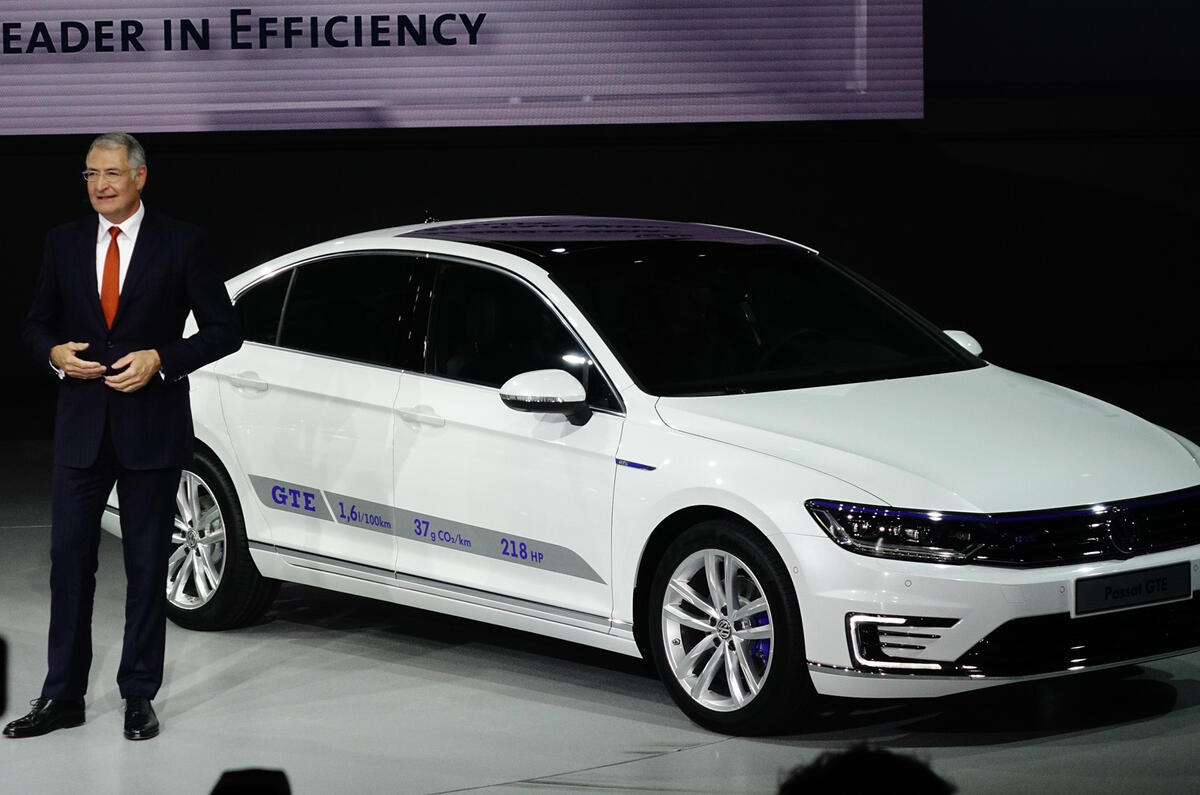Volkswagen’s ‘group nights’ have become a fixed point on the global motor show circuit.
The night before a big motor show opens, VW commandeers the biggest exhibition hall in town (one year, converting Beijing’s Olympic swimming pool) and rolls out never fewer than eight or nine concepts or new models from its 12-brand line-up.
The night before this week’s Paris motor show was no different. I watched from the stands as cutting-edge concepts such as the VW XL Sport and Lamborghini Asterion were driven up the ramp.
But perhaps the production-destined new Volkswagen Passat plug-in hybrid was the most important car at the exposition.
This – rather beautifully built – machine is just the sort of car that will become a much more familiar site on our roads by the end of the decade.
As the factory cost of hybrid transmissions falls and the cost of building ‘clean’ diesel engines increases (as well as the potential backlash against diesel pollution), mid-range hybrids such as this will help VW meet the EU CO2 ‘fleet’ target of 95g/km by 2020.
But once the razzle-dazzle was over, VW boss Martin Winterkorn stepped forward to deliver to EU legislators and politicians the most nuanced and diplomatic warning you are ever likely to hear.
The edited version was quite simple: before you set fleet CO2 targets for beyond 2020, give the industry a two or three-year breathing space.
Winterkorn pointed out that unless real consumers start to buy hybrid and battery electric vehicles in numbers, improving on the 95g/km Co2 average would be commercially impossible.
“Climate protection doesn’t come free,” as he put it. The upshot, is that the plug-in Passat – and cars like it – might yet mark the technical peak for the mass-market car.
You can’t, as Winterkorn didn’t quite say, force people to buy these low CO2 models. While he repeatedly stressed that VW was ‘rigorously’ in favour of the 2020 95g/km target and the ‘greening’ of its factories, his killer fact was that reducing CO2 output by 1g/km required VW to invest of “100 million euros every year”.
Winterkorn hinted that tougher EU targets could prevent the auto industry from “competing” globally if it was flattened in its home market by selling very expensive technology that it could not get consumers to pay for.
“We fully back the 95g/km target, but European carmakers must not be stopped from competing," Winterkorn said. "It took a huge effort to get to the 95g/km target and Volkswagen is spending 10 billion euros in Europe on research and development every year.
“I am making these objective and calm points. We can only have environmental sustainability if we can afford it. Otherwise we are calling industry into question. VW is doing its utmost to future-proof.”




Join the debate
Add your comment
stop it
PHEVS ALREADY COMPETITIVE ON PRICE.
How to really encourage "green" car use
In Norway, an electric car is not subject to VAT. You don't pay any of the road tolls or ferries (which for my daily commute are about £4 a day). You get to drive in the bus lane. These are real incentives which when considered along with the cost savings on fuel add up to thousands of pounds a year (in my case it would be about £5000 equivalent).
The result of this is that there are thousands of Nissan Leafs on the road. Teslas are commonplace (a decent model S costs about the same as diesel engined Audi A5 but has no associated fuel costs). The new e-golf will probably be the best selling car in Norway in 2015. This perspective shift has made regular cars all but obsolete overnight - most people buying a new car in Norway now would at least be considering an electric car.
Volkswagen has a valid point - it doesn't matter how green their cars are if there is no government incentive to buy one instead of a regular car.
In response to the comment on NOX emissions - Norway has had predominantly diesel driven cars for many years up to now and our smog problems in the valleys in winter are caused almost exclusively by NOX emissions from diesel engines. Diesel efficiency is great, but NOX is a problem. Most people are also unaware that a particle filter is largely ineffective until it is hot, and that most short commuting journeys are therefore actually producing a lot of particulates, especially in wintertime.
Norway is a member of the EEA and subject to EU laws and regulations, so I guess it is up to individual countries to step up the incentives for clean car use, and come up with an energy plan that doesn't involve burning more coal and gas which would be no better than diesel or petrol!
Minus28, the flaw in your